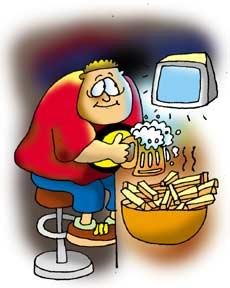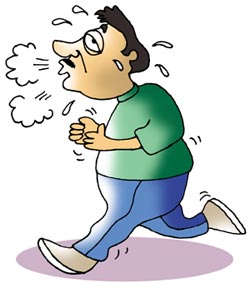Do you get sick often and take sick days off from work? Chances are you may have a weak immune system.
The immune system is the most important system of the body when it comes to preventing diseases. We are all born with different levels of immune systems. Some have a stronger immune system than others. But there are many things that can weaken an adequately strong immune system.
The immune system defends the body from developing potentially harmful diseases and conditions caused by bacterial, parasitic, fungal and viral infections. The immune system also restricts tumors and cancerous growths inside the body.
However, problems with the immune system can lead to illnesses and infections. Immune responses can be weakened by various external influences. Click on NEXT to find out the top 11 things that can weaken your immune system.
Illustrations: Uttam Ghosh/ Dominic Xavier
Chronic stress can ruin your health
Image: Chronic stress can increase risk of serious health problems.Photographs: Rediff Archives
1. Stress
People like to ignore it but stress has a major influence on your immune system. Chronic stress -- caused by stressful situations or events that last over a long period of time -- raises cortisol levels of the body which decreases the production of 'good' prostaglandins.
'Good' prostaglandins are localized hormone like cellular messengers that support immune function, dilate blood vessels, inhibit 'thick' blood and are anti-inflammatory.
Chronic stress can make you more susceptible to colds and the flu, as well as more serious health problems like heart disease, diabetes and other diseases.
By practicing stress-reducing activities like yoga, meditation and laughter, you can keep your body from going into chronic stress mode.
Highly processed foods are BAD
Image: Foods containing pesticides and preservatives make you vulnerable to developing chronic conditions.Photographs: Rick Wilking/Reuters
2. A poor diet
Prolonged and excessive consumption of refined sugars and highly processed foods containing pesticides, chemical additives, and preservatives can weaken the immune system and make you vulnerable to developing chronic conditions.
A study published in the American Journal of Clinical Nutrition found that the ability of white blood cells to kill bacteria is significantly hampered for up to 5 hours after eating 100 gm of sugar (equivalent to three cans of sweetened soft drink).
A healthy diet should include plenty of fruits, vegetables, whole grains, and low-fat milk.
Alcohol can damage your defense against viruses
Image: Alcohol can impede the functioning of immune cells, increasing susceptibility to infectious diseasesPhotographs: Rediff Archives
3. Excessive alcohol
Alcohol, like sugar, consumed in excess can reduce the ability of white blood cells to kill germs. Damage to the immune system increases in proportion to the quantity of alcohol consumed.
In the short term, excess alcohol intake will increase the number of colds you will experience.
In the long term, alcohol can impede the functioning of immune cells, increasing your susceptibility to infectious diseases and cancer.
Inadequate sleep ups serious health risks
Image: Good health requires you to get a good night's sleep.4. Lack of sleep
Without adequate sleep, the immune system doesn't get a chance to rebuild, and it becomes weak.
Poor sleep is associated with reduced number of T-cells, white blood cells that help the body fight disease.
Many studies show that people who don't get a good night's sleep or who don't get enough sleep (sleeping under seven hours a night) are more likely to get sick after being exposed to a virus, such as the common cold.
Obesity may increase influenza risk
Image: Obesity reduces the body's ability to control inluenza infection.5. Obesity
Obesity can lead to a weakened immune system. It can affect the ability of white blood cells to multiply, produce antibodies, and prevent inflammation.
A study conducted by new University of North Carolina at Chapel Hill School of Medicine on laboratory mice shows that obesity reduces the body's ability to turn on elements of its immune systems needed for controlling influenza infection.
Inactive people take more sick leave
Image: Exercise increases blood flow which promotes the process of expelling toxic waste out of your body.6. Lack of exercise
During moderate exercising, blood flow increases which promotes the process of expelling toxic waste out of your body.
The improved blood circulation also promotes circulation of antibodies and white blood cells that are important for fighting off infections. As little as 20 minutes of walking five days a week can help your immune system perform at its best.
According to one research, inactive people took twice as many sick days in 4 months when compared to people who walked briskly almost every day.
Excessive use of medicines is harmful
Image: Excessive use of antibiotics and cold and fever fighting medications weakens your immune system.Photographs: Reuters
7. Medications
Some prescription and non-prescription drugs are major toxins that many put into their bodies. Excessive use of antibiotics and cold and fever fighting medications weakens your immune system.
Researchers found that certain people taking antibiotics had reduced levels of cytokines -- the hormone messengers of the immune system.
You are more likely to develop resistant bacteria or become sick in the future when your immune system is suppressed.
Lack of proper hygiene spreads germs
Image: Habits like brushing your teeth twice daily can go a long way keeping infections at bay.8. Lack of hygiene
Lack of proper hygiene habits exposes your body to more germs thus leading to a weak immune system.
Habits like brushing your teeth twice daily, washing your hands properly before eating and keeping your nails neat and tidy can go a long way keeping infections at bay.
Radiation exposure causes skin diseases
Photographs: Eliseo Fernandez/ Reuters
9. Radiation exposure
Chemical exposure, UV, and radiation exposure damage the immune system.
Smoking is toxic
Image: Cigarettes contain over 4,000 chemicals, all of which are extremely toxic to the body.Photographs: Wiki Commons
10. Smoking
Cigarettes contain over 4,000 chemicals, all of which are extremely toxic to the body. And, more the amount of toxic substance in your body, weaker is the immune system.
Even exposure to secondhand smoke (passive smoke) can affect your immune system. It can trigger an asthma attack and aggravate symptoms in people with allergies.
So, not only quit smoking yourself, if you smoke, but also encourage your friends and family memebers to quit smoking too.
Dehydration increases the concentration of toxins in the blood
Image: Dehydration can affect your energy and the ability to get toxins and waste material out of your bodyPhotographs: Jorge Barrios/Wikimedia Commons
11. Dehydration
It is vital to maintain a good level of hydration to assist in eliminating byproducts of any illness and help the immune system fight off infection. Dehydration can affect your energy and your sleep, and the ability to get toxins/waste material out of the body.
Taking certain vitamins and supplements and making some lifestyle change can strengthen your immune systems.
Remember, you have only one line of defense. Better make it the best one!














Comment
article